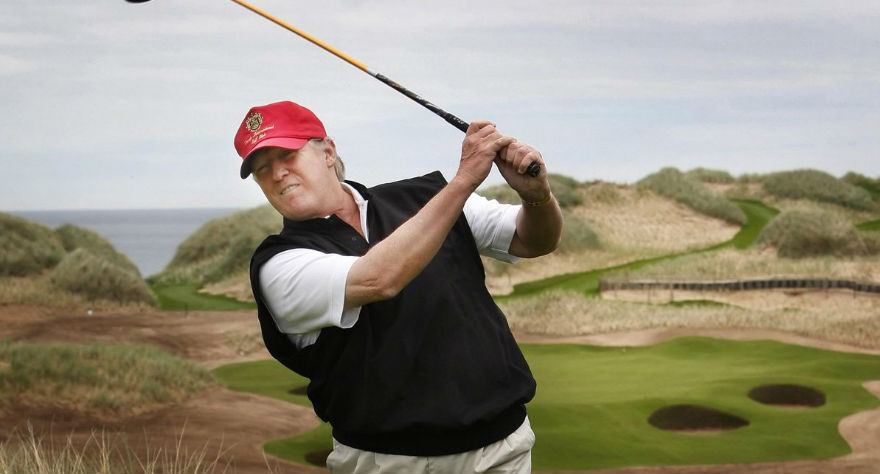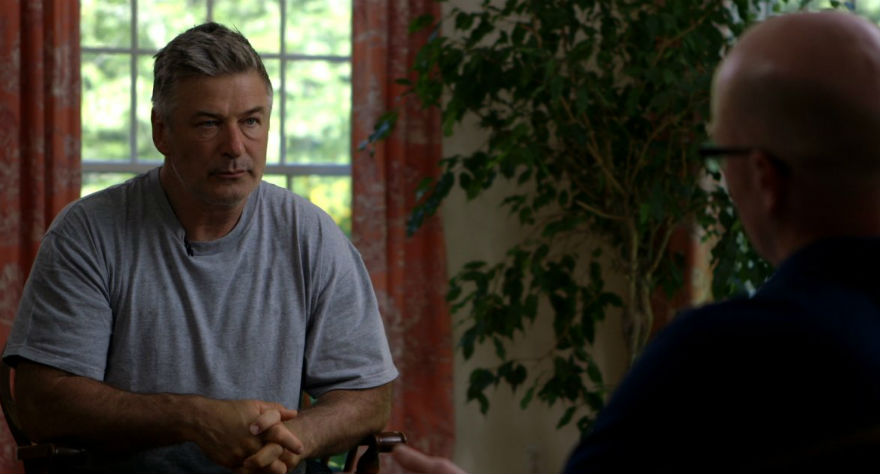The Real Donald Trump Gets Exposed In ‘A Dangerous Game’

Anthony Baxter’s 2011 documentary You’ve Been Trumped followed everyone’s favorite billionaire, Donald Trump, and his plans to invade a small Scottish town to build the golf course of his dreams for he and his rich club-mates to put around in. The film was shown on BBC and won some awards, but more interestingly, it earned Baxter the ire of Trump, who has since never hesitated to throw not-so-subtle jabs at the filmmaker whenever their paths cross in public.
Baxter continues to pester the presidential hopeful in A Dangerous Game, which follows essentially the same story but expands to the U.S. and Croatia, exploring the hazardous effects of giant golf courses on the natural environment and private lives of locals. This time around, Mr. Trump agrees to have a sit-down interview with Baxter on camera, and the resulting footage should serve as even more fuel for the Trump hate train, which is trucking full steam ahead at the moment. The film features interviews with Alec Baldwin, Robert Kennedy Jr. and more.
I spoke with Baxter about the dangers of this kind of large-scale environmental and community displacement as well as his tense dealings with Mr. Trump.
A Dangerous Game is available on demand now at adangerousgamemovie.com

What motivates you as a filmmaker and/or as an activist? I feel like it takes guts to provoke a grizzly bear like Donald Trump.
I think of myself as a filmmaker and journalist rather than an activist. I was motivated originally by the fact that Donald Trump was going to be building a golf course on a special site of interest and making these ludicrous economic claims about how much business it was going to bring to an area and build an important scientific wilderness area. That was what motivated me to follow the story. I had a lot of struggles along the way in doing that; I had to remortgage the house and use crowdfunding to make the first film. But I felt it was an important story to be told. The motivation for this film came out of showing that first film in communities around the world in which people would say, “We’ve got the same thing going on in our community.” It’s not always Donald Trump by name, but it’s Trump by nature. As Robert Kennedy Jr. says in the film, there are Donald Trumps in every community.
Often there’s a corruption of democracy when it comes to the environment. In Dubrovnik we see that story unfold in the film. I witnessed that in Scotland and the United States as well. There are these golf courses out in the desert that Barack Obama was playing in over the weekend, and in the Palm Springs area, the courses gobble up about 37 billion gallons of water a year in a drought-prone area. I think part of my motivation too is to get the message across that our planet can’t really afford this kind of thing anymore. The gap between the rich and poor is getting greater and the rich are looking for playgrounds to build these resorts for their own sole use. 99 percent of people are squeezed out of those areas, and precious resources like water are put at great risk. If you have a massive golf course in a place like Dubrovnik, it has an impact on ordinary people. Their water supply can’t cope with that kind of thirst the golf course has.
What’s the biggest misconception about the effect of these golf courses on their respective communities?
I think it’s that they somehow boost the community economically. They often end up costing the community because of the amount of infrastructure required to sustain them. In Scotland, Donald Trump promised he’d be bringing in 1.5 billion dollars in investments and creating 6,000 jobs at his golf course. Those were figures the Scottish government ate up and believed, but they were nonsense. We know now that, ten years on since he unveiled his plan, he’s delivered a fraction of what he promised, less than 200 jobs. I think those very flimsy economic arguments are the biggest misconception. There are environmental effects as well. You have a golf course over an aquifer like you do on Long Island, where the aquifer supplies a huge number of people, and nobody understands the effect of the chemicals that filter through the greens have on that water.
Trump’s unnecessary mockery of Michael Forbes’ property and attack on its lack of aesthetic appeal was pretty absurd.
This kind of bullying of ordinary people is a characteristic of his. In Scotland Trump claims he’s a good neighbor, but we’ve seen otherwise. He branded Michael Forbes a “pig.” It’s completely untrue. He builds huge mounds of earth next to people’s houses to stop them from being seen by his golfers. The impact is that people like Susan Monroe’s plants are dying. Trump doesn’t seem to care about that. He doesn’t care about the impact on these people because he wants them out of the way. It’s another dangerous side of this. I know the American media liked the fact that he announced he was running for president, and he was entertaining fodder for late night shows. He not only says alarming things, but does alarming things. He has a great power to manipulate media as he likes.
I interview people a lot, but I could never imagine being in the hot seat you were in. You didn’t look rattled at all sitting feet away from Donald Trump or the mayor of Dubrovnik, both men who view you as harsh opposition. What’s going through your head as you confront these people?
You just have to try to put those natural feelings to the side. You have to remember you’re there to represent the people who don’t have the access Trump does. When you have someone like Michael Forbes and his mother, who’s 90 years old, they don’t have the access to lawyers and airways Trump does. Often the organizations behind these big developments have a relationship with the media, which is very alarming. In Scotland, Trump essentially has access to print whatever he wants in the local newspaper. When we released our film in Scotland, the papers ignored it. That happens time and time again. I have to remember as I sit in front of Donald Trump that I’m there to represent the people. He didn’t give the time of day to them or me, at first at least. He says in the film I’ve become a more important person since the BBC showed my film. It’s a bit of insight into the way he views people. It’s this massive disconnect which is getting even greater between the people like Trump in Trump Tower and the ordinary people on the street. His comments about Mexico were just shocking. It shows that disconnect. The alarming thing is, people listen to what he says.
Trump and his people almost dare you to include what they’re saying in the film. They pre-accuse you of leaving out their statements in their entirety. The funny thing is, they’re saying crazy things. Trump suggests that Forbes’ award as Scot of the Year was rigged. Don’t know why he’d want a statement like that left in.
He accuses that awards ceremony of being rigged, but then rigs his own award ceremony for his golf course. He gives himself an award for “Best Golf Course in the World.” You can’t make this stuff up. The facts are stranger than fiction. What we’ve tried to do is make this film as cinematic as we can. It’s important. We show the beautiful lands of Croatia and Scotland to show what’s at stake. We worked with animators who worked on Searching For Sugarman to get the data across to the audience in an innovative way. We’ve brought the film to digital platforms because we think it’s really important for people to see it at this very important juncture. Trump’s running for president, and people need to see what he’s really like.
